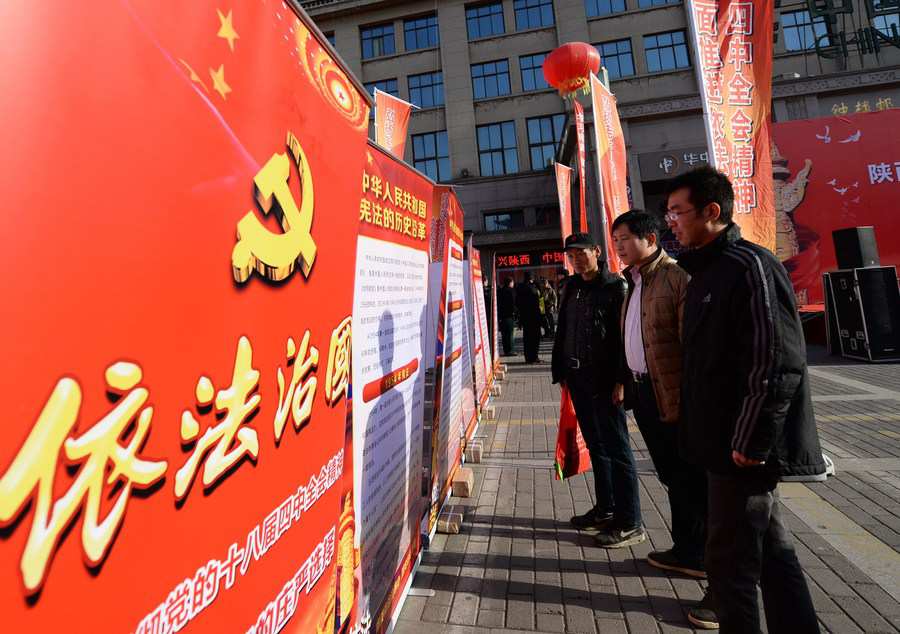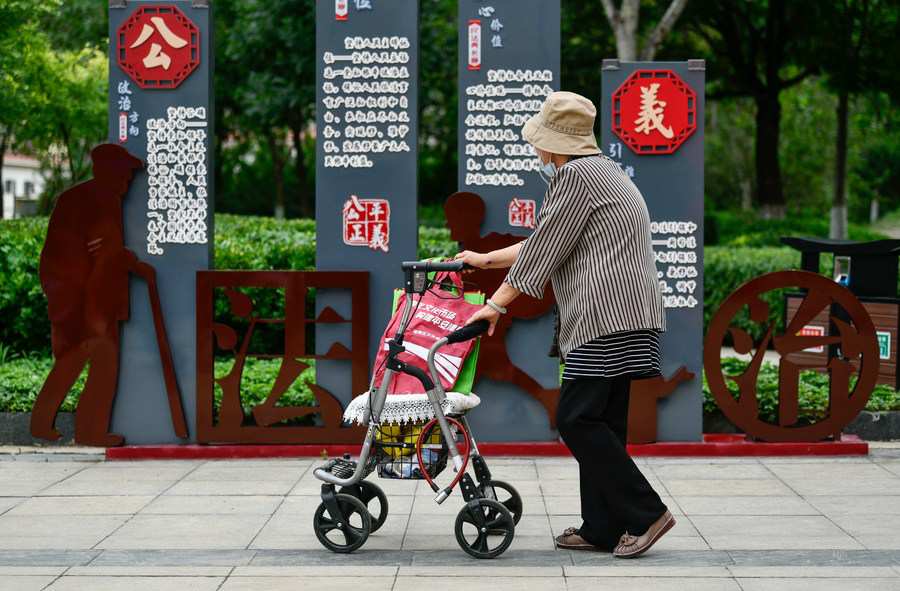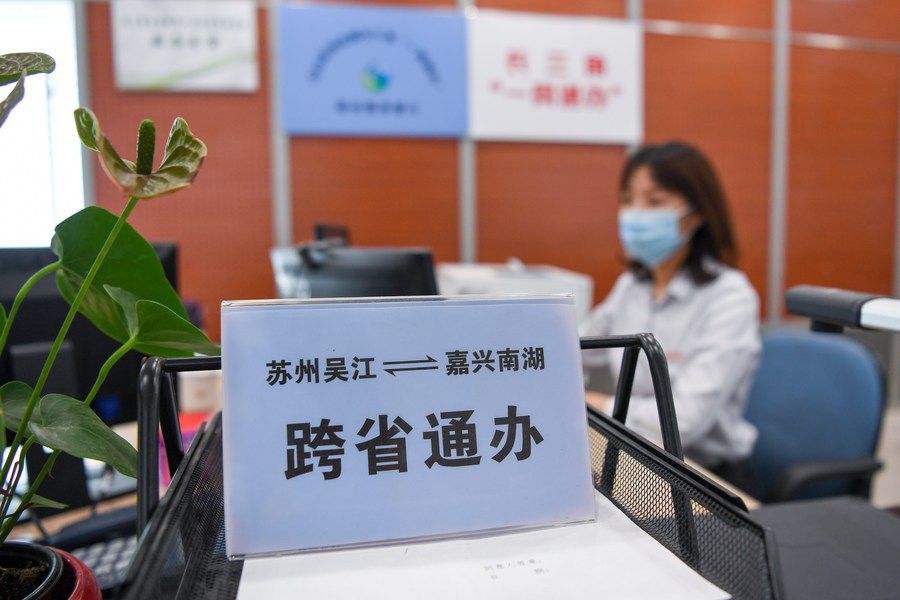


Citizens watch billboards on rule of law during an activity of Constitution Day in Xi'an, capital of northwest China's Shaanxi Province, Dec. 4, 2014. (Xinhua/Li Yibo)
-- Xi said fairness and justice are the lifeline of the rule of law.
-- The ultimate goal of China's rule of law is to protect the interests of the people.
-- "The reason why we advance law-based governance in all respects and take measures to unswervingly enforce the rule of law is for the sake of generations to come and long-term development," Xi stressed.
BEIJING, Nov. 18 (Xinhua) -- The Communist Party of China (CPC) convened its first central conference on work related to overall law-based governance this week.
At the event, Xi Jinping Thought on the Rule of Law was described as the guideline for advancing China's overall law-based governance.
The rule of law is also a key term in a new development blueprint drawn up by the Party leadership for the country's march toward modernization.
"The goal of building a country, government and society based on the rule of law shall be basically achieved by 2035," according to the plan. By that time, China is also expected to have basically achieved socialist modernization.
A NEW ERA
Xi Jinping, general secretary of the CPC Central Committee, has consistently championed the rule of law throughout his political career.
Since the 18th CPC National Congress in 2012, Xi put forward a series of new ideas, new thinking and new strategies to advance law-based governance in all respects.
Xi Jinping Thought on the Rule of Law was first unveiled in full and in detail in October 2014, when the 18th CPC Central Committee held its fourth plenary session, focusing on law-based governance.
The goal was set: developing a socialist rule of law system with Chinese characteristics and building a socialist rule of law country. The basic framework for law-based governance was specifically laid out.
Xi said fairness and justice are the lifeline of the rule of law, and he demanded fostering the rule of law for the people, by the people.
He said power must be exercised in an institutional cage, and administrative bodies should not do things not mandated by law.
"Just one wrongly-adjudicated case can ruin the reputation accumulated through the fair trials of 99 cases," Xi said.

Deng Xing, a judge of the People's Court of Gongshan County, carries the national emblem on his back while walking with his colleagues on a bridge over the Nujiang River in Nujiang Lisu Autonomous Prefecture, southwest China's Yunnan Province, Aug. 30, 2019. Due to the inconvenient transportation in the mountainous prefecture, Deng often has to carry the national emblem on his back and walk to provide legal services to local residents in rural areas. (Xinhua/Jiang Wenyao)
In the past eight years, more than 50 major miscarriages of justice have been re-addressed.
The rule of law has become the basis for all aspects of work.
Guided by Xi Jinping Thought on the Rule of Law, the socialist rule of law with Chinese characteristics is taking shape.
FOR THE PEOPLE
The ultimate goal of China's rule of law is to protect the interests of the people.
The socialist rule of law system with Chinese characteristics, with the Constitution at its heart, is constantly being improved. By August 2020, China had 279 national laws in force and more than 600 administrative regulations.
Major pieces of legislation adopted in recent years include the amendments to the Criminal Law and the Administrative Procedure Law, as well as the Civil Code.

A citizen walks along a path with the theme of the Civil Code of the People's Republic of China at a park in Jinnan District of north China's Tianjin, Aug. 20, 2020. (Photo by Sun Fanyue/Xinhua)
Under law-based governance, China has become one of the safest countries in the world, with the lowest homicide rate per 100,000 people. The country's traffic management reform has benefited more than 800 million people, while the people's rate of satisfaction with public security has reached 95.55 percent.
To protect the environment, the country stepped up law-enforcement inspections on environmental protection and promoted ecological conservation with public-interest litigations.
Public awareness of the rule of law has also been strengthened. Xi has emphasized that only by establishing the public's faith in the legal system can the law function properly.
FOR THE FUTURE
The rule of law has helped safeguard the country's security, territorial integrity and its opening-up initiative.
China is making steady progress on implementing the Constitution in all aspects of state governance. It has passed the National Anthem Law, the National Flag Law and the National Emblem Law, as well as the Law on Safeguarding National Security in the Hong Kong Special Administrative Region.

Photo taken on June 29, 2020 shows a billboard about the Law of the People's Republic of China on Safeguarding National Security in Hong Kong Special Administrative Region (HKSAR) in Central area in Hong Kong, south China. (Xinhua/Wang Shen)
The rule of law is the most favorable environment for business. Over the past few years, China has enacted the Foreign Investment Law, revised its Patent Law and the Copyright Law, and introduced new measures to enhance the protection of the property rights of enterprises.
Based on these efforts, China's business environment has been constantly improving.
From improving an open and transparent system of foreign-related laws to upholding the authority of international law and order, China has pledged to unwaveringly stick to the rule of law in its reform and opening-up drive to seek mutual benefit and win-win outcomes.

Photo taken on May 28, 2020 shows an administrative service center offering convenient and efficient governmental service in Wujiang District of Suzhou, east China's Jiangsu Province. (Xinhua/Li Bo)
"Advancing reform, development and stability cannot be achieved without the rule of law," Xi said.
"The reason why we advance law-based governance in all respects and take measures to unswervingly enforce the rule of law is for the sake of generations to come and long-term development," he stressed.

 Award-winning photos show poverty reduction achievements in NE China's Jilin province
Award-winning photos show poverty reduction achievements in NE China's Jilin province People dance to greet advent of New Year in Ameiqituo Town, Guizhou
People dance to greet advent of New Year in Ameiqituo Town, Guizhou Fire brigade in Shanghai holds group wedding
Fire brigade in Shanghai holds group wedding Tourists enjoy ice sculptures in Datan Town, north China
Tourists enjoy ice sculptures in Datan Town, north China Sunset scenery of Dayan Pagoda in Xi'an
Sunset scenery of Dayan Pagoda in Xi'an Tourists have fun at scenic spot in Nanlong Town, NW China
Tourists have fun at scenic spot in Nanlong Town, NW China Harbin attracts tourists by making best use of ice in winter
Harbin attracts tourists by making best use of ice in winter In pics: FIS Alpine Ski Women's World Cup Slalom
In pics: FIS Alpine Ski Women's World Cup Slalom Black-necked cranes rest at reservoir in Lhunzhub County, Lhasa
Black-necked cranes rest at reservoir in Lhunzhub County, Lhasa China's FAST telescope will be available to foreign scientists in April
China's FAST telescope will be available to foreign scientists in April